Basic molecular dynamics analysis¶
Note: This example requires AMS2023 or later.
This example illustrates how to calculate the basic
velocity autocorrelation function (VACF)
diffusion coefficient from the integral of the VACF
power spectrum (Fourier transform of the VACF)
viscosity from the Green-Kubo relation (integral of the off-diagonal pressure tensor autocorrelation function)
density along the z axis
For details about the functions, see the AMSResults API.
Technical
The example only shows how to technically calculate the numbers. For real simulations, run longer MD simulations and carefully converge any calculated quantities.
Note
More advanced analysis is possible by setting up an AMSAnalysisJob job.
See also: Molecular Dynamics with Python
Example usage: (Download BasicMDPostanalysis.py)
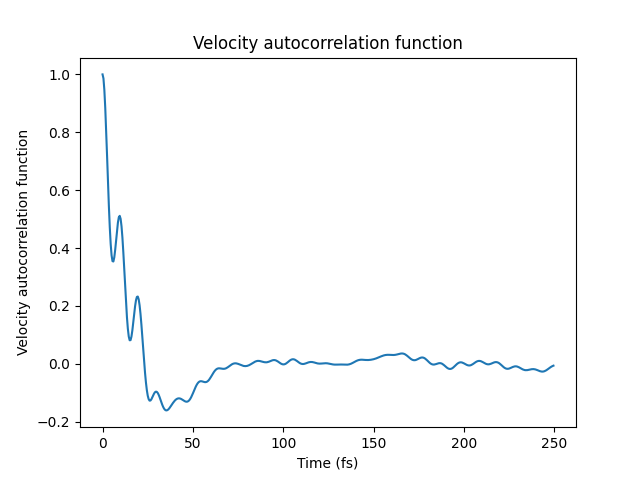
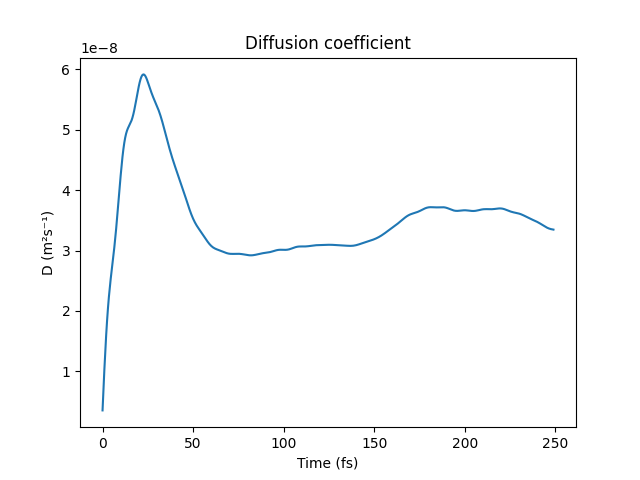
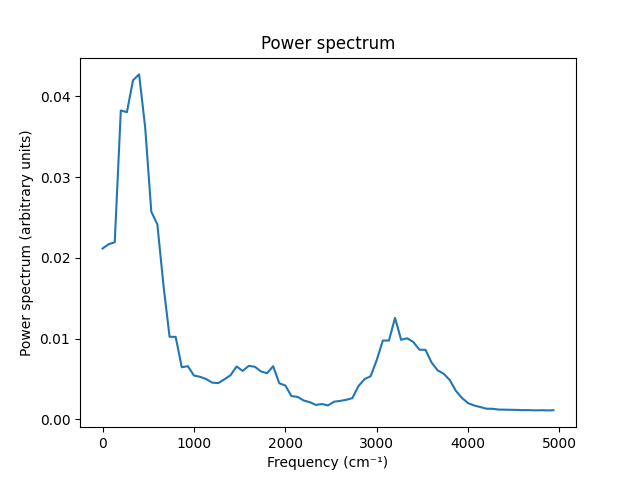
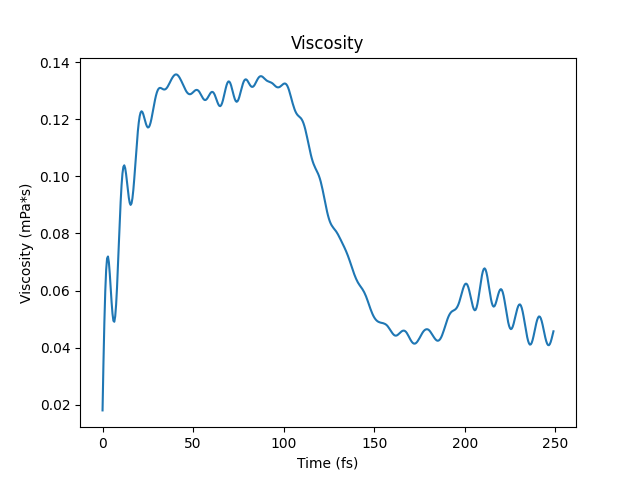
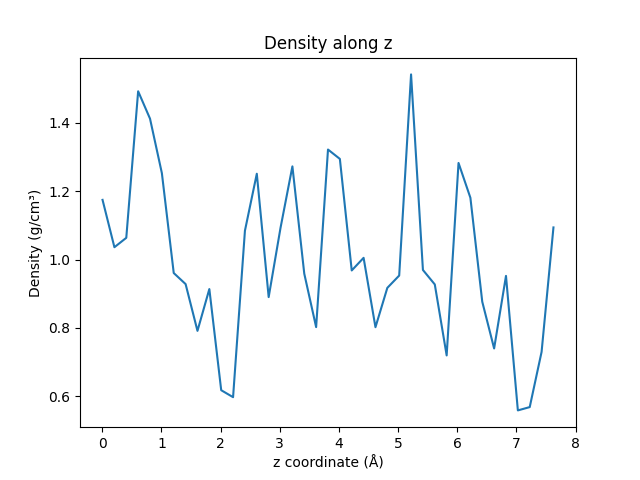
#!/usr/bin/env plams
from scm.plams import *
import numpy as np
import os
import matplotlib.pyplot as plt
def run_md():
mol = packmol_liquid(from_smiles('O'), n_molecules=16, density=1.0)
s = Settings()
s.input.ams.Task = 'MolecularDynamics'
s.input.ReaxFF.ForceField = 'Water2017.ff'
s.input.ams.MolecularDynamics.CalcPressure = 'Yes'
s.input.ams.MolecularDynamics.InitialVelocities.Temperature = 300
s.input.ams.MolecularDynamics.Trajectory.SamplingFreq = 1
s.input.ams.MolecularDynamics.TimeStep = 0.5
s.input.ams.MolecularDynamics.NSteps = 2000
s.runscript.nproc = 1
os.environ['OMP_NUM_THREADS'] = '1'
job = AMSJob(settings=s, molecule=mol, name='md')
job.run()
return job
def plot_results(results):
plt.clf()
times, vacf = results.get_velocity_acf(start_fs=0, max_dt_fs=250, normalize=False)
normalized_vacf = vacf / vacf[0]
plt.plot(times, normalized_vacf)
plt.xlabel("Time (fs)")
plt.ylabel("Velocity autocorrelation function")
plt.title("Velocity autocorrelation function")
plt.savefig("plams_vacf.png")
A = np.stack((times, normalized_vacf), axis=1)
np.savetxt("plams_vacf.txt", A, header="Time(fs) VACF")
plt.clf()
t_D, D = results.get_diffusion_coefficient_from_velocity_acf(times, vacf)
plt.plot(t_D, D)
plt.xlabel("Time (fs)")
plt.ylabel("D (m²s⁻¹)")
plt.title("Diffusion coefficient")
plt.savefig("plams_vacf_D.png")
A = np.stack((t_D, D), axis=1)
np.savetxt("plams_vacf_D.txt", A, header="time(fs) D(m^2*s^-1)")
plt.clf()
freq, intensities = results.get_power_spectrum(times, vacf, number_of_points=1000)
plt.plot(freq, intensities)
plt.xlabel("Frequency (cm⁻¹)")
plt.ylabel("Power spectrum (arbitrary units)")
plt.title("Power spectrum")
plt.savefig("plams_power_spectrum.png")
A = np.stack((freq, intensities), axis=1)
np.savetxt("plams_power_spectrum.txt", A, header="Frequency(cm^-1) PowerSpectrum")
plt.clf()
t, viscosity = results.get_green_kubo_viscosity(start_fs=0, max_dt_fs=250) # do not do this for NPT simulations
plt.plot(t, viscosity)
plt.xlabel("Time (fs)")
plt.ylabel("Viscosity (mPa*s)")
plt.title("Viscosity")
plt.savefig("plams_green_kubo_viscosity.png")
A = np.stack((t, viscosity), axis=1)
np.savetxt("plams_green_kubo_viscosity.txt", A, header="Time(fs) Viscosity(mPa*s)")
plt.clf()
z, density = results.get_density_along_axis(axis='z', density_type='mass', bin_width=0.2, atom_indices=None)
plt.plot(z, density)
plt.xlabel("z coordinate (Å)")
plt.ylabel("Density (g/cm³)")
plt.title("Density along z")
plt.savefig("plams_density_along_z.png")
A = np.stack((z, density), axis=1)
np.savetxt("plams_density_along_z.txt", A, header="z(angstrom) density(g/cm^3)")
def main():
job = run_md()
# alternatively:
# job = AMSJob.load_external('/path/to/ams.rkf')
plot_results(job.results)
if __name__ == '__main__':
main()